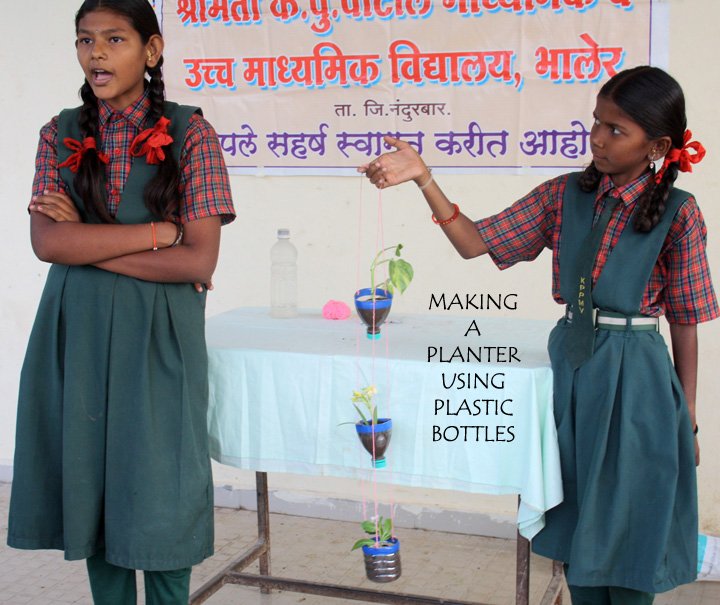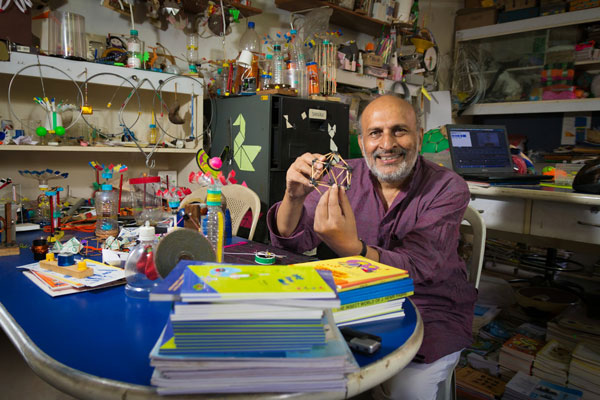

The TWAS ( Third World Academy of Sciences) Regional Prize for Public Understanding and Popularization of Science (2010).Sri Chandrasekarendra Saraswati National Eminence Award conferred by the South Indian Education Society, Mumbai (2010).The Dadhichi Award given by The Education Society, Ambarnath, Maharashtra (2012).Distinguished Math Teacher's Award, Association of Maths Teachers of India (AMTI) (2016).Narendra Dabholkar Memorial Award by the Maharashtra Foundation (2018). He has won several awards for his lifelong efforts at popularizing science and in designing teaching aids for young children. His talk was among the 10 best TED talks compiled by Sir Ken Robinson and Sugata Mitra's 5 favorite education talks.

His popular TED Talk: Turning Trash into Toys for learning gives an insight into his work and philosophy. Gupta draws inspiration from a number of people, including Gautama Buddha, George Washington Carver and his mother. Gupta's website holds instructions, including short video clips on YouTube, in a number of languages, for making hundreds of improvised toys, which he makes available freely without copyright restrictions. His first book, "Matchstick Models and other Science Experiments" was reprinted in 12 languages. These simple toys, he found, fascinated children and Gupta went on to make these as the hallmark of his movement of popularising science. While he was there he developed his idea of creating simple toys and educational experiments using locally available materials as well as items usually thrown as trash. Gandhian in outlook, Arvind Gupta participated in the Hoshangabad Science Teaching Programme (HSTP) in Madhya Pradesh in 1978. Gupta has conducted workshops in over 2000 schools and has won many national and international awards.Īs a student in the 1970 s in Indian Institute of Technology, Kanpur, Gupta became a socialist in belief but eschewed action-less discourse he stated that instead he "placed more faith in small positive action than empty rhetoric." Gupta began his social service by teaching the children of the mess staff who had no opportunities for formal education. The possibilities of using ordinary things for doing science and recycling modern junk into joyous products appealed immensely to children.Īrvind Gupta's first book, Matchstick Models and other Science Experiments, was translated into 12 Indian languages by various Popular Science groups and sold more than half a million copies. While there, he developed many useful low-cost teaching/science teaching aids using locally available materials. After viewing his website, everything around me is starting to look like a potential toy! If you’d like to see more of Arvind Gupta, you may want to watch his TED talk.A graduate from IIT Kanpur (1975 batch), Arvind Kumar Gupta took a year's study leave from TELCO (in 1978) to work with the grassroots village science teaching programme for children in the tribal district of Hoshangabad, Madhya Pradesh called Hoshangabad Science Teaching Programme.

His materials can also be used for teaching creativity. Of course, Gupta is also a living example of flexible thinking, problem finding, and seeing new possibilities in everyday materials. What young person couldn’t become entranced by a do-it-yourself treasure chest of new toys?

It can be the inspiration for hours of science instruction or a parent’s best rainy day friend. His website includes directions, in multiple languages, for making hundreds of toys, complete with written directions and short videos. Gupta’s YouTube channel has a wonderful collection of “Toys from Trash” videos, with toys that demonstrate scientific principles. And oh, by the way, creating his own brand of science education along the way. And he’s devoted his career to providing children all over the work with the inspiration and tools to do so. Gupta believes that children learn best by touching, feeling, cutting, sticking - pulling things apart, putting things together. Arvind Gupta is one of those people every educator should know.


 0 kommentar(er)
0 kommentar(er)
